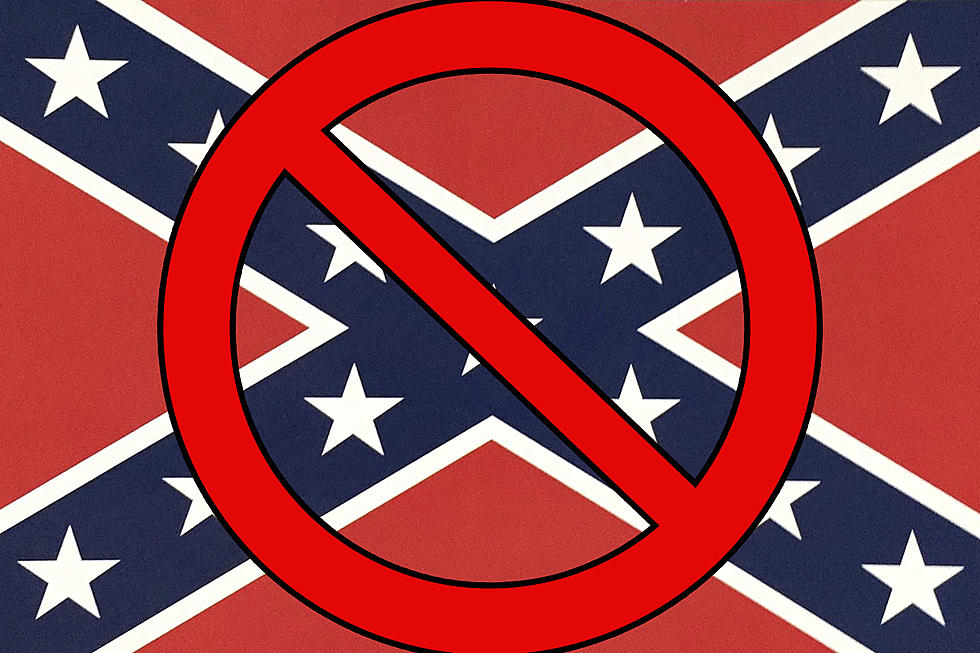
Op-Ed: The Confederate Flag Isn’t a Symbol of Rebellion — It’s a Symbol of Racism
Rock and metal music has a complicated history with the Confederate flag. Just kidding, it’s not that complicated: The Confederate flag is a racist symbol and has no place in rock music (or anywhere).
Now, I’m NOT saying anyone who has ever used or supported the use of this flag in music is a racist who should be canceled, hated and never forgiven. People learn new things and change their opinions every day. To grow as individuals and a society it’s imperative that we educate ourselves, challenge past beliefs and acknowledge mistakes.
That’s why I am going to do my best to explain to you why it’s time to stop making excuses and let the flag go.
First, let’s take a quick look at the history of the Confederate flag in rock and metal, where it is often argued that the flag represents rebellion.
One of the acts most prominently connected to the Confederate flag is Lynyrd Skynyrd, who were known for using the flag as a stage backdrop, on their merchandise and even featured it on the cover of their 1988 live album Southern by the Grace of God.
It was legitimately a huge part of the band’s image.
In 2012, Skynryd decided to stop using the Confederate flag. The last surviving original member, guitarist Gary Rossington, explained why during a CNN appearance.
"Through the years, people like the KKK and skinheads kinda kidnapped the Dixie or Southern flag from its tradition and the heritage of the soldiers, that's what it was about," Rossington said at the time. "We didn't want that to go to our fans or show the image like we agreed with any of the race stuff or any of the bad things."
Essentially, they acknowledged what the flag represented and they didn’t want to be associated with those things. Though I would argue it was never hijacked in the name of white supremacy — it has always been about white supremacy — it’s commendable that Skynyrd took a stand even though it meant they’d lose some supporters.
Plenty of other artists have used the imagery including Tom Petty, Ted Nugent and Kid Rock. Pantera’s late Dimebag Darrell, Ozzy Osbourne’s Zakk Wylde and Poison’s Bret Michaels all had Confederate flag guitars. If you’re interested in reading more about these artists’ use of the flag (most of which have abandoned the use of it) you can check out this piece diving into the genre’s history with the flag by our sister site Ultimate Classic Rock.
As mentioned before, the flag has long been seen by many as a sign of southern heritage and rebellion, hence its ties to Southern rock. Through the years, people have come up with many excuses and defenses for the flag, trying to convince others that it’s not racist and it means something different to them.
That’s where things get slightly complicated, only because I do think some of these people believed or wanted to believe it was simply a symbol of rebellion or states rights or their heritage or whatever — but the reality is that it isn’t those things. It has never been about those things. It is (and always has been) a symbol of racism.
One of the most common arguments in defense of the Confederate flag (or any monument celebrating the Confederacy for that matter) is “You can’t change history” or “You can’t erase history.” So, let’s talk about the actual history.
The Civil War was fought by the South, or the Confederacy, to preserve slavery and promote white supremacy. This is not my opinion. This is a fact.
It’s made clear in Mississippi's declaration of secession, which states, "Our position is thoroughly identified with the institution of slavery — the greatest material interest of the world." In a speech given weeks before the start of the Civil War, the Confederacy’s vice president explicitly stated that the Confederacy’s foundation "rests upon the great truth that the Negro is not equal to the white man; that slavery — subordination to the superior race — is his natural and normal condition.”
So, while it is nicer to imagine that this represents some outlaw spirit, that’s revisionist history. It’s not about states rights or independence or rebellion.
The South depended on agriculture, which depended on slavery. They were fighting for their “right” to own black people. Period.
People were enslaved and abused for economic gain, and that is not something that should be celebrated.
It didn’t stop there, though. The Dixie flag had some revivals through the years. Ironically enough, those tend to come on strongest as progress was being made in Black Americans’ fight for civil rights — notably in the early 1900s as white Southerners attempted reasserting their dominance through Jim Crow laws and in the ‘50s and ‘60s as the Civil Rights movement gained momentum.
The flag was used against activists in an attempt at intimidation.
The early 1900s (decades after the South lost the Civil War and were instituting Jim Crow) and around the Civil Rights Act of 1964 happens to be when a large portion of Confederate statues were erected on public land. So you can decide if you think those were put there by mourning widows of Confederate soldiers to mark a time in history or placed there to send a message.
None of these are new ideas. They have been repeated ad nauseam probably every time this argument has come up in the last 200-plus years.
Imagine the message it would send to post swastikas at concerts and sporting events. Why is this different?
We don’t live in the Confederate States of America, and when it comes down to it, it’s pretty simple: They lost the war, and they don’t get to fly their flag.
So when people argue, “They’re trying to take our history or culture” — we’re not erasing the Confederacy, but we need to remember it honestly and for what it actually was.
More From 92.9 NiN










